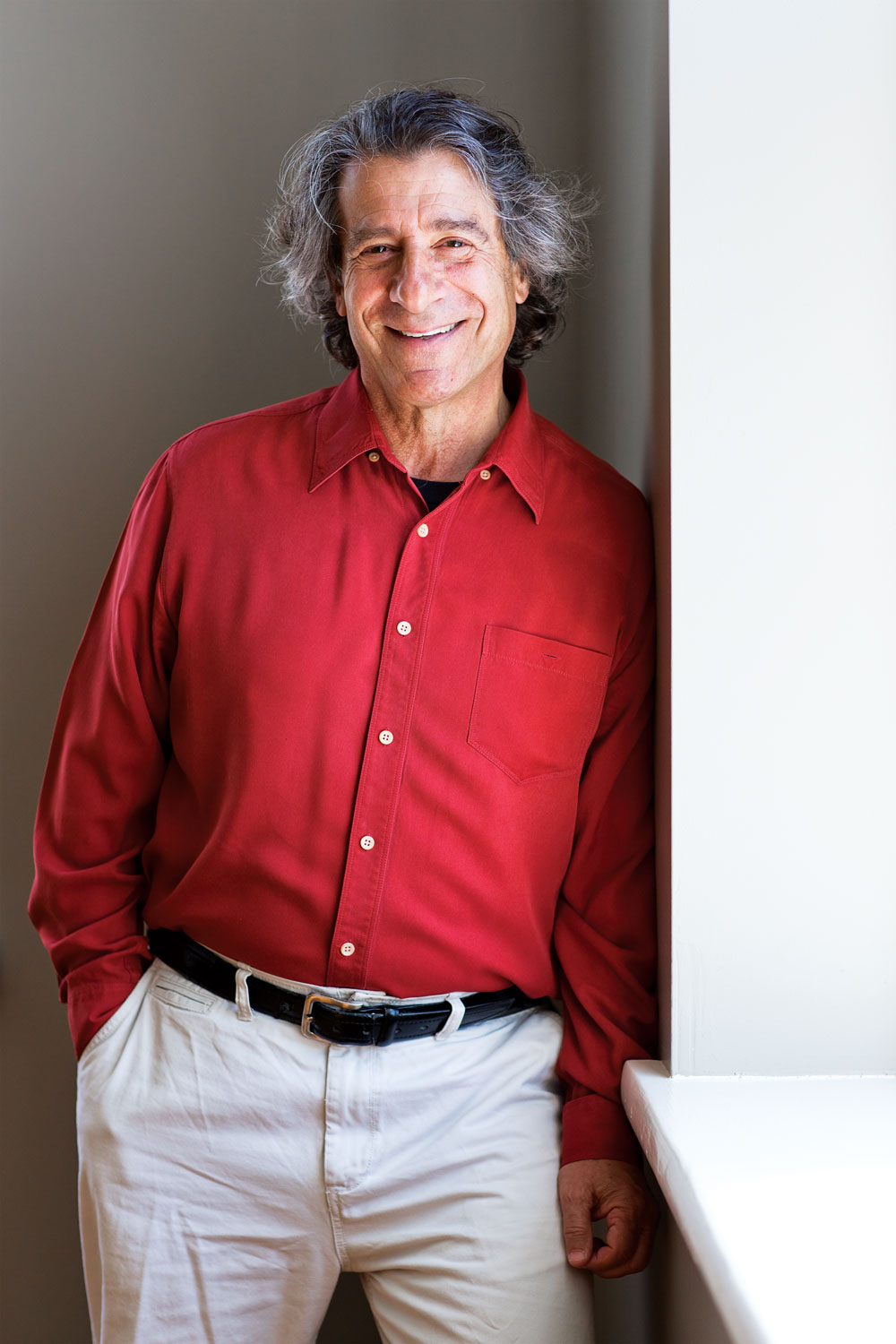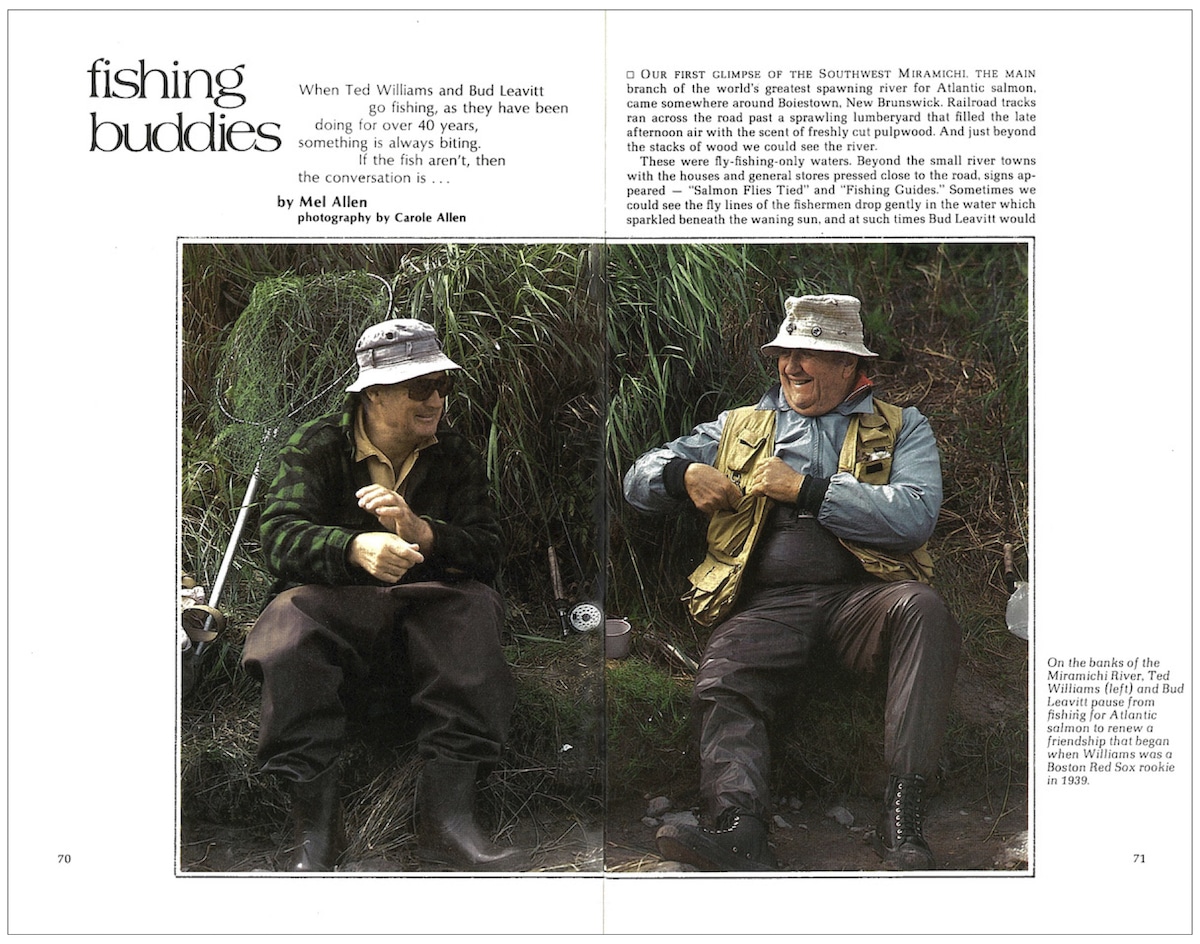Back Stories: What Ted Williams Taught Me About Writing
In his new online column, editor Mel Allen takes readers behind the scenes of some of his most unforgettable Yankee stories.

Ted Williams, left, with Bud Leavitt.
Photo Credit : Carole Allen
Photo Credit : Jarrod McCabe
A little more than a year ago, I started writing “Letter from Dublin” in this space. I wanted to document how my small-town life in southern New Hampshire was unfolding when the world seemed to shed a bit of normalcy nearly every day.
I have always wished I had kept a journal from boyhood, the way I know other writers have. Now, decades later, “Letter from Dublin” is that journal. I imagine it will have the seemingly eternal shelf life of online words, which live where no paper ever yellows. Whenever I need to remember the twined feeling of fear and hope that fastened to us these past many months, I know where to look.
Going forward, “Letter from Dublin” will have a new home: in Yankee’s print magazine, my natural habitat, where I have roamed since my first byline appeared in 1977. There have been a lot of stories since then — those I have written, as well as those of so many writers whose work made me feel as though I could not imagine being anywhere else.
What you read in a magazine will always be a fraction of the anecdotes, conversations, and background of what a writer knows. The raw material gets sculpted by leaving as much, if not more, on the editing floor as on the printed page.
This new column, “Back Stories,” will pick up some of those shavings and bring them back. These are stories that have stayed with me because the people I met have stayed with me, even if I never saw them again.
“Fishing Buddies,” from April 1982
Whenever I give a talk somewhere, I am often introduced as someone who fished with Ted Williams, the greatest and most celebrated Boston Red Sox player of all time. There have been ardent anglers who come up to me afterward, their eyes wide: “You fished with Ted Williams!” So I want to set the record straight.

I had once taken a weekend fly fishing class with L.L. Bean. I owned waders, a fishing vest, a rod, a line, and a modest collection of flies. But when I went to meet with Ted Williams, he was known as the most skilled and prolific game fishermen and fly caster in the country. And he was famously caustic and dismissive of people, especially members of the media, who did not share his extraordinary talent. To cast a fly under his watchful eye would require a confidence and courage I did not possess. More important, I was not there to actually fish but simply to watch two lifelong friends lock horns for a few days.
I came to Ted Williams’s fishing lodge, perched beside a deep salmon pool on the Miramichi River in New Brunswick, in late September 1981, when he was in his early 60s. I was there because I had become friends with Bud Leavitt, the sports editor for the Bangor Daily News, whose ties to Williams went back decades. I was only two years into my Yankee career, and I always felt, but never asked, that Bud wanted to give me a big story.
In Maine, Bud was as famous as Ted Williams. Mainers began their mornings reading his outdoors column, which he wrote for nearly 50 years, and his public television show, Woods and Waters, had a national audience. “Anybody who goes fishing in Maine and doesn’t have Mr. Leavitt as his leader has gone wrong somewhere, probably in boyhood,” wrote the late Red Smith.
I met Bud in the summer of 1980, when I came to Bangor to write about Maine’s first moose hunt lottery. More than 30,000 hopeful hunters had ponied up $5 apiece in the hopes their name would be one of the 700 drawn from a rotating drum. Bud’s show from the Bangor Auditorium was televising it live. “If you’re expecting something more exciting than a three-hour beano game, you’re on the wrong channel,” he said.
Bud and I did not have hunting or fishing to form a friendship, but he had gone into newspapers right out of high school. What we shared was a love of stories and the people who told them.
Bud and Ted Williams went back to 1939, when the brash Red Sox rookie became fascinated with the equally young Maine writer who knew where to fish, to hunt, and most important, where to escape in the wilderness. And it was there, in Maine, that the lives of two men from different coasts bonded. The wilderness became their shared playing field.
From the moment Bud and I stepped inside the fishing lodge and saw Ted sitting at the long wooden table, his dinner plate clean, I knew this would be a different kind of trip.
I described our arrival this way:
“You said five o’clock. You’ve messed up our evening’s fishing already,” Williams flung to Bud in greeting.
“I can go home,” Leavitt replied.
“Do you know how lucky you are to be here?” Williams said.
They talked that night sitting on the porch until it got too cold and then they moved inside. Few sentences slipped by without jabs about the other’s weight or lack of talent in the outdoors or taste in equipment, arguing over the proper number of pockets in a fishing vest, whether raincoats should have pockets at all.
What I did not write was that within five minutes of our arrival, Ted looked at me and said, “I don’t know why Bud brought you here, but you can stay on one condition.”
“What is that?”
“Ask interesting questions.”
In that moment, he distilled the essence of how to fill a notebook so that a story worth telling emerges. You have to engage, to make it so interesting for the person you are interviewing that they want to tell you about their life.
After the story was published, J.J. Nissen, one of Maine’s largest bakeries, saw how these two larger-than-life fishing buddies could team up and quarrel about whether, say, whole wheat or white bread was better. The resulting TV spots became some of the classic Maine commercials of their day.
Forty years have passed since those days I spent by the river, watching Ted Williams tying flies at 5 in the morning, and casting his line in the twilight. When Bud died in 1994, I thought of Ted Williams, a man who did not make close friends easily, and certainly not with writers. In the way they agitated each other in nearly every conversation, you might think they were simply two quarrelsome men growing old. But anyone paying attention could see it was how they expressed what two burly men would rarely say, no matter how deep their friendship: that each barb, the sharper the better, was a way to say love.
Read more: Mel Allen’s “Fishing Buddies”
Mel Allen
Mel Allen is the fifth editor of Yankee Magazine since its beginning in 1935. His first byline in Yankee appeared in 1977 and he joined the staff in 1979 as a senior editor. Eventually he became executive editor and in the summer of 2006 became editor. During his career he has edited and written for every section of the magazine, including home, food, and travel, while his pursuit of long form story telling has always been vital to his mission as well. He has raced a sled dog team, crawled into the dens of black bears, fished with the legendary Ted Williams, profiled astronaut Alan Shephard, and stood beneath a battleship before it was launched. He also once helped author Stephen King round up his pigs for market, but that story is for another day. Mel taught fourth grade in Maine for three years and believes that his education as a writer began when he had to hold the attention of 29 children through months of Maine winters. He learned you had to grab their attention and hold it. After 12 years teaching magazine writing at the University of Massachusetts-Amherst, he now teaches in the MFA creative nonfiction program at Bay Path University in Longmeadow, Massachusetts. Like all editors, his greatest joy is finding new talent and bringing their work to light.
More by Mel Allen

